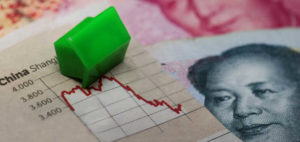Chinese investors and home buyers are facing a contagion of bad news in China’s property markets. The Financial Times reports:
Contagion is spreading into the deep tissue of China’s political economy. What began as a property crisis — characterised by slumping apartment sales and a rash of debt defaults by developers — is now morphing into a financial crunch at the local government level.
A new world of difficult choices looms before Chinese policymakers as a crucial congress of the ruling Communist party this month looks set to award another term in office to Xi Jinping, China’s authoritarian ruler.
With the market slump, thousands of local government financing vehicles (LGFVs), which since the financial crisis have provided the main impetus behind China’s investment-driven growth, are either running short of funds or teetering on the brink of unprecedented defaults, analysts say. Local governments have long depended on land sales to property developers to balance their books.
Taken together, the slumping property market, the sputtering investment engines of local governments and a hefty burden of national debt signals the end for a model of growth that has not only transformed China but also been the biggest generator of global economic expansion for well over a decade.
A woman pushes a cart of water bottles towards her unfinished flat in Guangxi where she is living © Reuters
Dan Wang, chief economist at Hang Seng Bank, a Hong Kong-headquartered bank with significant operations in mainland China, says the economy has arrived at an inflection point. “The old model of relying on infrastructure and housing has essentially finished,” she says.One of the next twists, according to Wright, is likely to be unprecedented defaults by LGFVs on the domestic bonds they issue. If LGFVs do default, it will signal the crossing of a “Rubicon”, he says.
This is partly because these bonds — which have financed the construction of roads, railways, power plants, airports, theme parks and hundreds of other pieces of infrastructure — have been assumed to enjoy an implicit government guarantee. More materially, such defaults could also destabilise a $7.8tn mountain of debts built up by such LGFVs, sending chills through an already cooling economy.
To put it in context, that figure for LGFV debt is the equivalent of nearly half of China’s total GDP in 2021 — or, for example, about twice the size of Germany’s economy.
Read more here.

